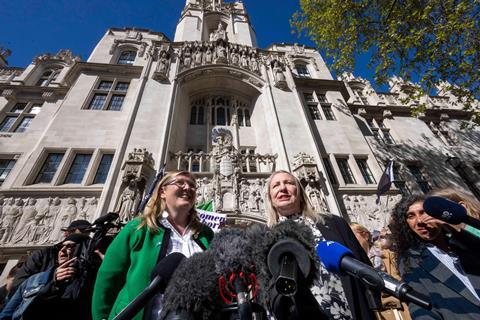Employment solicitors have shared their thoughts on the impact of the Supreme Court’s judgment on the definition of ‘woman’, ‘sex’, and ‘man’ in the Equality Act 2010.
Chelsea Feeney, employment associate at Guildford-based firm Stevens & Bolton, said the ‘landmark decision’ would ‘forever shape the legal landscape of gender recognition and sex-based rights in the UK’. She added: ‘Whilst this judgment pertains to the application of “woman” in the Gender Representation on Public Boards (Scotland) Act 2018, I strongly suspect it will be referred to in many more disputes and policies to come, especially as debates around diversity and equality policies continue to rage.’
Speaking of the possible impact on employers, Feeney said it ‘could mean that a review of human resources policies and diversity training is necessary, to ensure they accord with the updated definition of a “woman” in relation to biological gender without reference to those who have obtained a gender recognition certificate’.
She added: ‘Employers who operate single sex services or spaces may also need to reassess their policies to ensure these reflect the new position, which could lead to the exclusion of transgender individuals who hold gender recognition certificates from spaces which do not align with their biological gender, unless exceptions apply. However, employers should note that the Equality Act 2010 still affords transgender people protection from discrimination through the protected characteristic of their gender reassignment. Transgender people are also still able to claim sex discrimination because they are perceived to be their acquired gender.’

Read more
Jonathan Mansfield, employment law partner at London-firm Spencer West, said there was ‘clearly a need for legislative clarification’.
He added: ‘This latest ruling highlights inconsistencies in sex-based rights in employment and poses some practical issues for employers. Certain rights which are currently available related to sex such as equal pay will only be available based on biological sex. A trans woman, for example, will not have the right to bring an equal pay claim on the basis that she is paid less than a (biological) man.
‘There is specific protection against discrimination for those who have undergone or propose to undergo gender re-assignment. However, this protection does not extend to all those who would be entitled to apply for a gender recognition certificate where the requirements include a diagnosis or gender dysphoria and having lived in the acquired gender for at least two years among other requirements.’
Jessica Keal, family law associate at London firm Simkins, which specialises in media and commercial law, said the Supreme Court decision is ‘right at the heart of where several competing rights collide’.
She added: ‘The transgender community has faced much upheaval lately with the publication of the Cass review and the ban on the prescription of puberty blockers to children and young people, and today’s decision will be seen by many as another blow. This ruling will have real implications for transgender women and their rights to use single-sex services and spaces, but it also impacts biological women who have fought hard to secure single-sex spaces where they feel safe.’





























